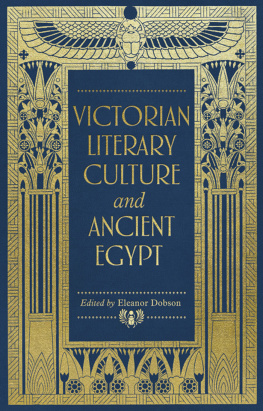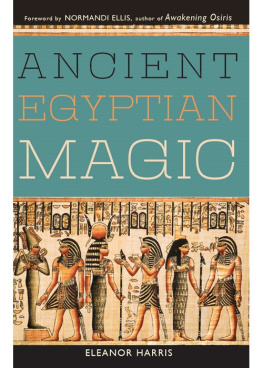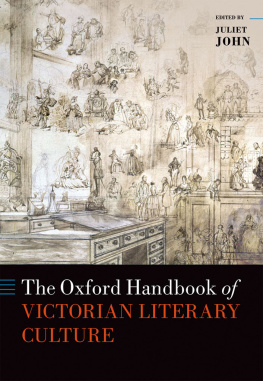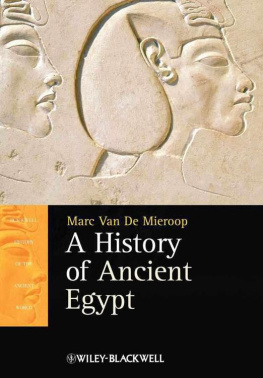Victorian literary culture and ancient Egypt
Victorian literary culture and ancient Egypt
Edited by
Eleanor Dobson
Manchester University Press
Copyright Manchester University Press 2020
While copyright in the volume as a whole is vested in Manchester University Press, copyright in individual chapters belongs to their respective authors, and no chapter may be reproduced wholly or in part without the express permission in writing of both author and publisher.
Published by Manchester University Press
Altrincham Street, Manchester M1 7JA
www.manchesteruniversitypress.co.uk
British Library Cataloguing-in-Publication Data
A catalogue record for this book is available from the British Library
ISBN978 1 5261 4188 0 hardback
First published 2020
The publisher has no responsibility for the persistence or accuracy of URLs for any external or third-party internet websites referred to in this book, and does not guarantee that any content on such websites is, or will remain, accurate or appropriate.
Typeset
by New Best-set Typesetters Ltd
In memory of Nickianne Moody (19632019),
without whom this volume would not have been possible
Hathem Bastawy holds a PhD in English and History. He is a Fellow of the British Higher Education Academy, a Fellow of the Royal Anthropological Institute and a former Teaching Fellow in Drama and Postcolonial Literature at the University of Leeds. He received the John Murray Prize for his research in 2015 and the SWAPCA Languages and Literatures Award in February 2017, and has published widely on various aspects of English literature and history.
Angie Blumberg is a Postdoctoral Fellow at Auburn University, USA. Her current book project, Our Real Life in Tombs: British Literature and Archaeology, 18801930, unearths archaeological discourse at the centre of late Victorian and modernist discussions about gender and sexuality, decadent aesthetics and the First World War. Her work is published in Literature Compass, Victoriographies, Tulsa Studies in Women's Literature and a collection of essays on the novelist Marie Corelli entitled Reinventing Marie Corelli for the Twenty-First Century (Anthem Press 2019).
Jasmine Day is a cultural anthropologist, teacher, Egyptologist and President of the Ancient Egypt Society of Western Australia Inc. She specialises in the history of mummies roles in popular media, literature and museums, and the ethics of exhibiting Egyptian mummies. Her work includes The Mummy's Curse: Mummymania in the English-Speaking World (Routledge 2006) and papers in Egypt: Ancient Histories, Modern Archaeologies (Cambria Press 2013), Histories of Egyptology: Interdisciplinary Measures (Routledge 2014) and various academic and popular journals. She has been a regular contributor to the International Congress on Mummy Studies and the Tea with the Sphinx conferences (University of Birmingham) and has appeared in several television documentaries and podcasts.
Eleanor Dobson is Lecturer in Nineteenth-Century Literature at the University of Birmingham, UK. She specialises in the reception of ancient Egypt in the nineteenth and twentieth centuries, as well as the Gothic and occult, and has published on subjects including representations of the ghost of Oscar Wilde, jewel imagery in Bram Stoker's Dracula, ghost stories set in Egyptian hotels and generic crossover between the imperial Gothic and the fairy tale.
Luz Elena Ramirez is Professor of English at California State University, USA, where she specialises in nineteenth- and early twentieth-century British literature. She is interested in themes of collection, the intrusion of the past into the present, and the intersections between literary and area studies, which provided the focus for her first book, British Representations of Latin America (University Press of Florida 2007). In addition, she has published scholarship on George Chetwynd Griffith and William Hope Hodgson. Recently, she helped to establish the Mediterranean Studies Academy at CSUSB, an interdisciplinary initiative that includes a partnership with the Robert and Frances Fullerton Museum of Art whose collections include Egyptian antiquities.
Giles Whiteley is Docent in English Literature at Stockholm University, Sweden. He has published widely on nineteenth-century literature and philosophy from Romanticism through to early modernism. He is the author of monographs: Aesthetics of Space in Nineteenth Century British Literature (Edinburgh University Press 2020), Schelling's Reception in Nineteenth Century British Literature (Palgrave Macmillan 2018), Oscar Wilde and the Simulacrum (Legenda 2015) and Aestheticism and the Philosophy of Death (Legenda 2010). He is currently working on a book on nineteenth-century humour for Routledge and a critical edition of Walter Pater's 1885 novel Marius the Epicurean for Oxford University Press.
Sara Woodward (ne Brio) received her PhD from the University of Leeds, UK. Her research focuses on the ways in which nineteenth-century authors create and authorise views of ancient Egypt in their fiction as a means of defining their own religious beliefs. Her other published works include The Shocking Truth: Science, Religion, and Ancient Egypt in Early Nineteenth-Century Fiction, Nineteenth-Century Contexts (2018).
Molly Youngkin is Professor of English at Loyola Marymount University, Los Angeles, USA. She has published two critical monographs, British Women Writers and the Reception of Ancient Egypt, 18401910: Imperialist Representations of Egyptian Women (Palgrave Macmillan 2016) and Feminist Realism at the Fin de Sicle: The Influence of the Late-Victorian Woman's Press on the Development of the Novel (Ohio State University Press 2007). She has also published numerous articles and book reviews.
This volume has benefited from the input and ideas of many generous scholars, most notably the speakers and attendees of the Tea with the Sphinx conferences based at the University of Birmingham, and in particular to Nickianne Moody, to whom this volume is dedicated. My thanks also extend to Meredith Carroll and the anonymous reviewers for their patience, guidance and expertise.
Eleanor Dobson
Most significantly, however, Hiley playfully hints that Mike's resemblance to ancient Egyptian models might be attributed to his friendship with E. A. Wallis Budge, the former Keeper of the British Museum's Department of Egyptian and Assyrian Antiquities:
A master of Egyptian lore,
No doubt Sir Ernest had a store
Of charms and spells decipherd
From feline mummies long since dead,
And found a way by magic art
To win that savage feline heart.
Budge, who began working at the British Museum in 1883 and retired in 1924, is depicted in this excerpt as a kind of sorcerer who accesses Egyptian magic through his translation of ancient spells.
While such a short and, admittedly, unusual text might seem fairly historically insignificant at first glance, on reconsideration it neatly encapsulates popular perceptions of ancient Egypt, museums with Egyptian collections, and Egyptologists themselves, which all underwent significant cultural developments over the course of the nineteenth century. Without the solid foundation of Victorian culture that preceded it, such a memorial to Mike in the twentieth century steeped in ideas of the inheritance of ancient Egypt by modern Britain, ancient Egyptian magic as an ever-potent supernatural force and Egyptologists as occult gatekeepers would not have existed.








